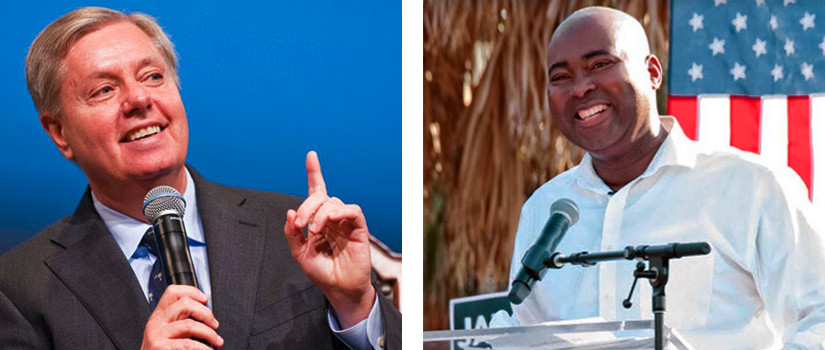Posted October 21, 2020
Democratic challenger Jaime Harrison has a commanding lead in social media support over Sen. Lindsey Graham just two weeks ahead of the Nov. 3 election, as Graham combats negative perception and conversations about Harrison grow.
The Social Media Insights Lab at the University of South Carolina reviewed more than 46,000 posts about the two candidates made in South Carolina since Oct. 1. For comments mentioning Harrison, 26 percent were positive and those positive mentions have been increasing.
By comparison, only 19 percent of the comments about Graham were positive. Meanwhile, Graham faces a significant backlash, with 37 percent of the comments mentioning Graham expressing negative sentiment. By comparison, 24 percent of the comments about Harrison were negative.
Recent polls have shown the two candidates in a dead heat, fueling speculation that the traditionally red Palmetto State could elect a Democratic senator for the first time in 22 years. And trends on social media lend those polls credibility, according to lab manager Kait Park.
Positive social media comments about Harrison are up almost 33 percent from a month ago and the month of October is not over. So far in October, Harrison has been mentioned positively 5,586 times. In the entire month of September, he was mentioned positively 4,206 times.
“When we first started watching these conversations over the summer, the number of mentions and unique users were still much lower for Harrison, while positive sentiment was high, suggesting we were seeing a small but enthused fan base,” Park says. “But since then, Harrison’s share of voice has risen dramatically, almost equaling Graham’s. That indicates he’s gaining broad support among South Carolinians, not just resonating with a vocal minority.”
During the October research period, the number of comments about Harrison and Graham, known to researchers as share of voice, were nearly equal. Graham was mentioned 25,586 times by 4,652 unique authors. Harrison was mentioned 21,656 times by 4,035 authors. A unique author in this sample is a user who has mentioned one or both candidates at least once. Harrison’s unique author count since Jan. 1 is 8,194, meaning October accounts for nearly half of the new voices this year. Graham’s unique author count since Jan. 1 is 11,357.
What’s driving Harrison’s positive sentiment? The lab’s researchers noticed spikes during both debates. People said they thought Harrison won and expressed plans to vote for him, sometimes retweeting campaign messages.
Graham’s high negative sentiment included critiques of his debate performance, refusal to take a COVID test prior to the first debate and his comment about “the good old days of segregation” during the Oct. 13 Supreme Court confirmation hearing for Judge Amy Coney Barrett.
“Negative conversations about the Graham’s test refusal and his segregation comment temporarily drove up his share of voice,” Park says. “Those two events really had an impact in South Carolina social media conversations, so we can tell these are issues that people felt strongly about.”
The Insights Lab has been tracking the Graham-Harrison race since July and will continue monitoring it leading up to Nov. 3. Earlier reports are available here.
About the Social Media Insights Lab
The lab is part of the College of Information and Communications. It is used for teaching,
academic research and public reports intended to help people better understand issues
of the day.
View a full list of reports and follow the lab on Twitter at @UofSCInsights.
